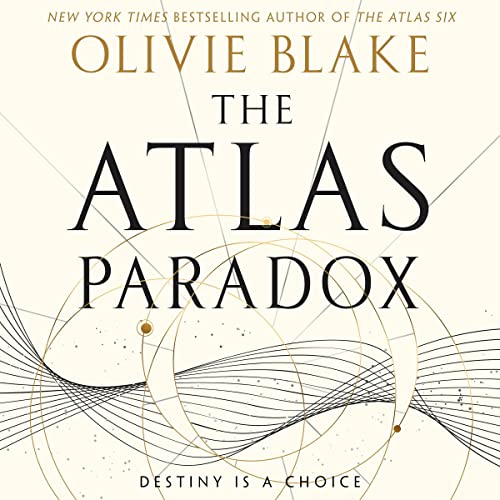 The Atlas Paradox (The Atlas, #2) by Olivie Blake
The Atlas Paradox (The Atlas, #2) by Olivie Blake Narrator: Alexandra Palting, Andy Ingalls, Caitlin Kelly, Damian Lynch, Daniel Henning, David Monteith, James Cronin, Munirih Grace, Siho Ellsmore, Steve West
Format: audiobook, eARC
Source: supplied by publisher via NetGalley
Formats available: hardcover, paperback, ebook, audiobook
Genres: dark academia, fantasy
Series: Atlas #2
Pages: 416
Length: 18 hours and 28 minutes
Published by Macmillan Audio, Tor Books on October 25, 2022
Purchasing Info: Author's Website, Publisher's Website, Amazon, Barnes & Noble, Kobo, Bookshop.org, Better World Books
Goodreads
“DESTINY IS A CHOICE”
The Atlas Paradox is the long-awaited sequel to dark academic sensation The Atlas Six—guaranteed to have even more yearning, backstabbing, betrayal, and chaos.
Six magicians. Two rivalries. One researcher. And a man who can walk through dreams. All must pick a side: do they wish to preserve the world—or destroy it? In this electric sequel to the viral sensation, The Atlas Six, the society of Alexandrians is revealed for what it is: a secret society with raw, world-changing power, headed by a man whose plans to change life as we know it are already under way. But the cost of knowledge is steep, and as the price of power demands each character choose a side, which alliances will hold and which will see their enmity deepen?”
My Review:
 This story of dark academia, utter corruption and potentially the end of the world follows directly after the events of The Atlas Six – right after the Six seemingly become five. Only not through the murder that everyone expected to be committed.
This story of dark academia, utter corruption and potentially the end of the world follows directly after the events of The Atlas Six – right after the Six seemingly become five. Only not through the murder that everyone expected to be committed.
And not that the expected victim of that expected murder, Callum Nova, is exactly anyone’s favorite person. Not even Callum himself. If anyone should have, would have been saved it was the missing Libby Rhodes. Who is equally not dead.
She’s furious. Or she would be if her captor wasn’t drugging her into oblivion.
So this story begins in fracture – and the characters just keep right on fracturing from a very inauspicious beginning to the bitter, deadly end.
The library at the heart of the Alexandrian Society may be sentient. It’s certainly hungry. It expects a sacrifice to its altar of knowledge every ten years. A blood sacrifice. A dead medeian (read as mage) to add body (literally) to its spice of knowledge.
Callum wasn’t killed, Libby isn’t dead, so the library spends the entire book getting its pound of flesh in any way it can, causing all of the characters to devolve and fracture over their second year at the Society. It’s not a pretty sight.
As each of the six descends down their own personal rabbit hole of self-involvement mixed with delusions of grandeur and/or inadequacy, refusing to acknowledge the gaping hole in their midst that should be filled by Libby Rhodes, Society Caretaker Atlas Blakely and his former friend turned rival, Ezra Fowler, plot and plan their way to oppose each other’s end-of-the-world scenario.
While Libby Rhodes applies a sharp rock to what’s left of her moral compass so she can power a nuclear blast that will bring her home. To a future that she may yet manage to destroy. If someone else doesn’t beat her to the punch.
Escape Rating C: I’m of two minds when it comes to The Atlas Paradox – even more so than I was after finishing The Atlas Six. Only more so.
Following the story of The Atlas Paradox was like doing “The Masochism Tango” – without even a scintilla of the joy that the masochist singing the song felt.
So why did I keep going? Because the voice actors were every single bit as excellent as they were in The Atlas Six. It’s a pity that they gave their excellence to a work which did not deserve it. (And I continue my frustration that there doesn’t seem to be a complete and definitive list of who is voicing whom.)
What helps make the narration so wonderful – while making the story so frustrating as well as frequently annoying – is that the whole story is told from the inside of the characters’ heads. Every single one of these people is a hot mess, and not in any fun ways at all. They’re also, individually and collectively, utterly morally bankrupt.
So I didn’t like any of them and I didn’t feel for any of them and most importantly, I didn’t CARE about any of them. They are, individually and collectively, self-indulgent, self-absorbed and shallow, and the entirety of this story is spent plumbing the teaspoon-like depths of their shallowness.
 The Atlas Six was compulsively readable because so much shit happened, and the breakneck pace made it an absorbing page-turner no matter what genuinely awful people its characters were.
The Atlas Six was compulsively readable because so much shit happened, and the breakneck pace made it an absorbing page-turner no matter what genuinely awful people its characters were.
Little seems to actually happen in The Atlas Paradox until nearly the end, at least until it dissolves into a waiting game in preparation for the next book, The Atlas Complex. Which, I have to admit, I probably will listen to in spite of myself. I’m still curious to see how this ends. If it ends at all, and especially if it ends in anything other than the end of the world as they know it.
After all, I expect the narrators to still be utterly excellent, which is still the saving grace of this entire saga.

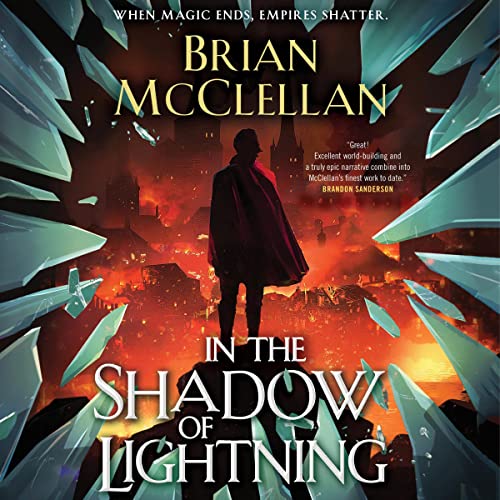 In the Shadow of Lightning (Glass Immortals, #1) by
In the Shadow of Lightning (Glass Immortals, #1) by 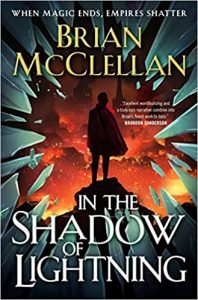 Escape Rating A+: “Glassdamn.” It rolls easily through the mind, or trippingly off the tongue, as though it’s an epithet that we’ve always used – or at least could have if we’d had a mind to. And glassdamnit but this is a terrific story.
Escape Rating A+: “Glassdamn.” It rolls easily through the mind, or trippingly off the tongue, as though it’s an epithet that we’ve always used – or at least could have if we’d had a mind to. And glassdamnit but this is a terrific story.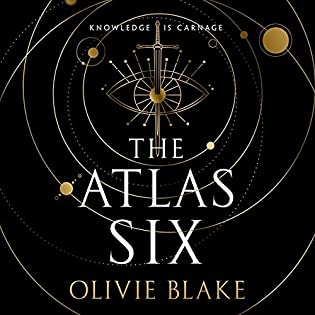 The Atlas Six (The Atlas, #1) by
The Atlas Six (The Atlas, #1) by  Which admittedly does ramp up the tension VERY dramatically for the second book in the series,
Which admittedly does ramp up the tension VERY dramatically for the second book in the series,  Lavender House (Evander Mills #1) by
Lavender House (Evander Mills #1) by 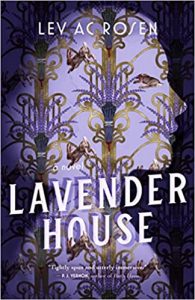 Escape Rating A+: There are so many ways to approach this story, and all of them work. Frankly, the story just works. It had me from that opening scene in the bar and didn’t let go until the bittersweet end. To the point where, as much as I LOVED the audiobook, I read the last third as text because I simply had to find out how it ALL worked out.
Escape Rating A+: There are so many ways to approach this story, and all of them work. Frankly, the story just works. It had me from that opening scene in the bar and didn’t let go until the bittersweet end. To the point where, as much as I LOVED the audiobook, I read the last third as text because I simply had to find out how it ALL worked out. Dirt Creek by
Dirt Creek by  Escape Rating B-: This is going to be one of those “mixed-feelings” kinds of reviews. You have been warned.
Escape Rating B-: This is going to be one of those “mixed-feelings” kinds of reviews. You have been warned.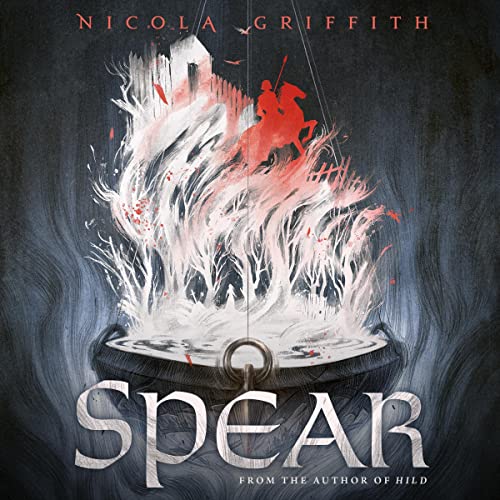 Spear by
Spear by 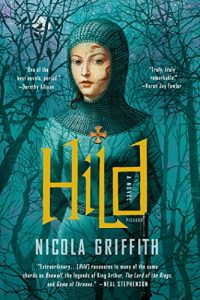 Spear turned out to be a lovely, lyrical, magical extension of the Arthurian legends that borrows rightfully and righteously, as all Arthurian tales do, from what has come before, from what fantasy writers have added to the period and the interpretation, from the time in which it is set, the time in which it is written, and the author’s magical stirring of that pot into a heady brew.
Spear turned out to be a lovely, lyrical, magical extension of the Arthurian legends that borrows rightfully and righteously, as all Arthurian tales do, from what has come before, from what fantasy writers have added to the period and the interpretation, from the time in which it is set, the time in which it is written, and the author’s magical stirring of that pot into a heady brew.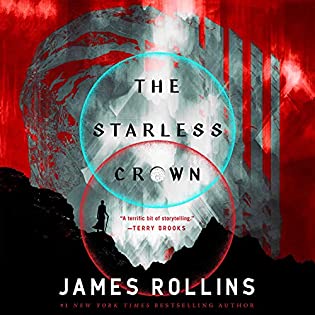 The Starless Crown (Moon Fall, #1) by
The Starless Crown (Moon Fall, #1) by  Fan Fiction: A Mem-Noir: Inspired by True Events by
Fan Fiction: A Mem-Noir: Inspired by True Events by 